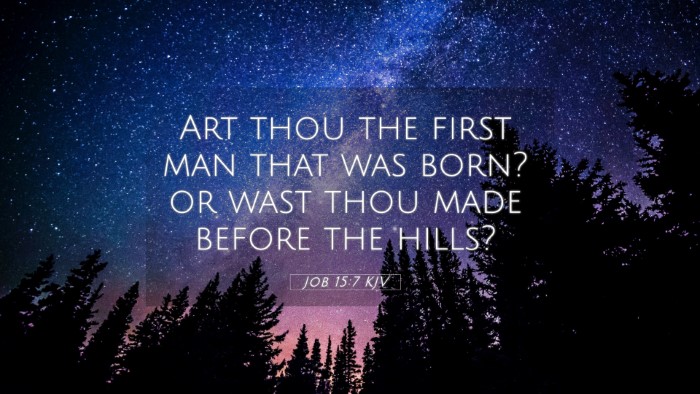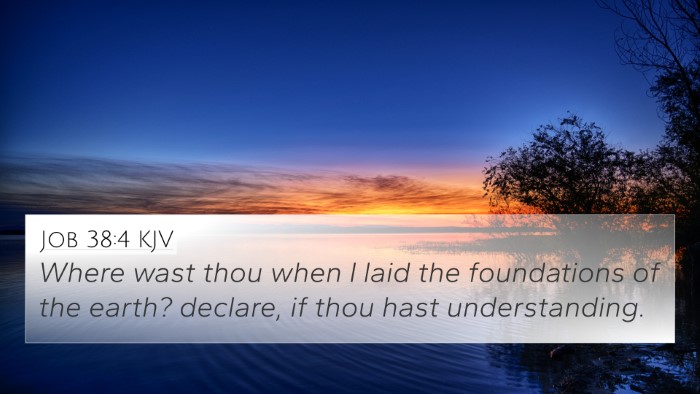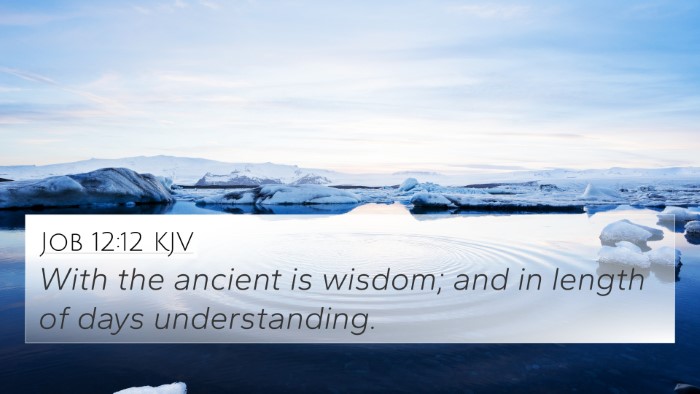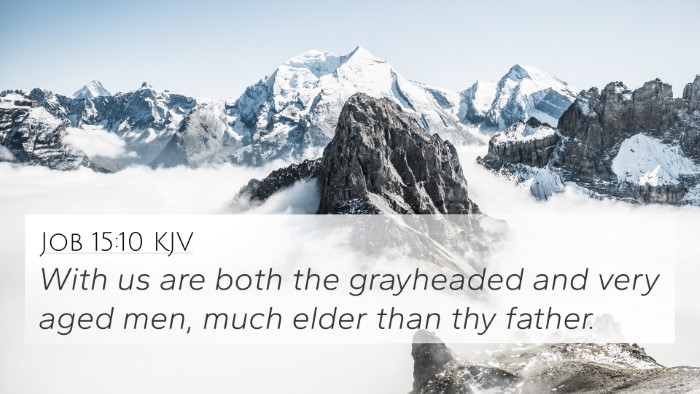Understanding Job 15:7
Job 15:7 states: "Art thou the first man that was born? or wast thou made before the hills?" This verse, part of Eliphaz's speech to Job, poses a rhetorical question suggesting that Job is presumptuous in his claims of innocence and understanding of God.
Summary of Insights from Commentaries
The combined insights from Matthew Henry, Albert Barnes, and Adam Clarke provide complementary perspectives on this verse:
- Matthew Henry: He remarks that Eliphaz implies Job's assertions are foolish given that he is a mere man. The implication is that Job lacks the perspective that only God possesses, questioning Job’s authority to challenge divine wisdom.
- Albert Barnes: Barnes highlights the arrogance in Job’s claims implying that he is suggesting he has an understanding of divine matters that even the most ancient beings do not possess. This is a call for humility before the incomprehensible mysteries of God.
- Adam Clarke: Clarke remarks on the importance of recognizing our place in relation to God. He emphasizes that no human, including Job, is above the limitations of human experience and understanding, which contrasts with God's eternal and omnipotent nature.
Themes and Cross-References
This verse touches on various themes such as human humility, divine omniscience, and the human condition. Below are some significant Bible verses that can be cross-referenced to enrich understanding of Job 15:7:
- Bible Verse: Psalm 8:4 - "What is man, that thou art mindful of him?" This verse echoes the humility needed in light of God’s greatness.
- Bible Verse: Isaiah 40:28 - "The everlasting God, the LORD, the Creator of the ends of the earth, fainteth not, neither is weary." This verse contrasts human frailty with God’s infinite strength.
- Bible Verse: Romans 11:33 - "O the depth of the riches both of the wisdom and knowledge of God!" This emphasizes the immeasurable wisdom of God, compared to human understanding.
- Bible Verse: Proverbs 3:7 - “Be not wise in your own eyes: fear the LORD, and depart from evil.” This speaks to the necessity of humility before God’s wisdom.
- Bible Verse: James 4:6 - "God resisteth the proud, but giveth grace unto the humble." This reinforces the theme of humility in God's presence.
- Bible Verse: Ecclesiastes 7:14 - "In the day of prosperity be joyful, but in the day of adversity consider: God also hath set the one over against the other..." This context of human experience emphasizes humility in both good and bad times.
- Bible Verse: Job 38:4 - "Where wast thou when I laid the foundations of the earth?" This is God questioning Job, showcasing divine wisdom that predates humanity.
- Bible Verse: 1 Corinthians 1:25 - "Because the foolishness of God is wiser than men; and the weakness of God is stronger than men." This verse reinforces the central idea of divine knowledge surpassing human understanding.
- Bible Verse: Isaiah 55:8-9 - "For my thoughts are not your thoughts, neither are your ways my ways..." This speaks directly to the vast difference between human thought and divine thought.
- Bible Verse: Job 4:17 - "Shall mortal man be more just than God?" which offers a similar question regarding human righteousness compared to divine righteousness.
The Importance of Cross-Referencing
Understanding Job 15:7 benefits greatly from cross-referencing with these other scriptures. Below, we explore the significance of cross-referencing Bible verses:
- Thematic Bible Verse Connections: Identifying themes across verses helps to create a holistic understanding of scripture. For instance, Job 15:7's theme of human limitation echoes throughout scripture.
- Bible Cross-Reference Guide: Tools such as Bible concordances provide a structure for exploring these connections thoroughly. This is vital for anyone engaged in deep scriptural study.
- Comparative Bible Verse Analysis: Analyzing the similarities and disparities between scripture allows for a richer interpretation and application of biblical teachings.
- Inter-Biblical Dialogue: Connections between the Old and New Testaments reveal the continuity of God's message and principles across differing contexts.
Conclusion
In studying Job 15:7, it becomes evident that humility before God and recognition of His omniscience are crucial themes. The insights from respected biblical commentators, combined with key cross-references, enhance the understanding of this verse profoundly. Engaging in comparative study using tools for Bible cross-referencing, fosters a deeper and more meaningful exploration of scriptural truths.








